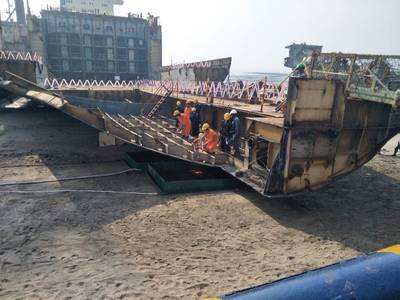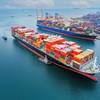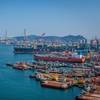EU Agreement Paves Way for Non-OECD Recycling Yards
A new EU agreement on waste shipments is set to remove a legal roadblock to make it possible for a raft of non-OECD ship recycling yards to be included on an EU-approved list, which would unleash much-needed shipbreaking capacity for a massive wave of tonnage due to be scrapped over the coming years, according to green recycling consultancy Sea Sentinels.
The European Parliament and Council have agreed to allow exports of hazardous waste, including that contained in EU-flagged ships, to non-OECD countries provided receiving facilities can document sustainable management and disposal of this waste in line with EU regulations under a proposed amendment to the EU Waste Shipment Regulation (WSR) expected to be ratified by year-end. This would be subject to the receiving facility being included on an EU-approved list.
Ships that are sold for recycling at the end of their lifetime contain hazardous materials such as asbestos, ODS, mercury and many others, as well as operational substances and waste including oil, fuel, ballast water and sludge, which constitute a risk both to human health and the environment if they are not managed and disposed of properly.
Exports of such waste in EU-flagged ships are currently banned by the EU under the Basel Convention on transboundary movements of hazardous waste, or Basel Ban, that is transposed into the WSR. In addition, the EU Ship Recycling Regulation (EUSRR) sets stringent standards for ship recycling and requires all EU-flagged vessels to be recycled at a facility on a list of approved yards.
“The latest EU agreement would represent a significant legal shift as it would open the way for many yards in non-OECD countries, which have applied for inclusion on the EU list and have been banging on the door for a very long time, to finally gain compliance with the EUSRR,” explains Rakesh Bhargava, Chief Executive of Singapore-based Sea Sentinels.
‘Expanding opportunities’
“At the same time, this would greatly expand the shipbreaking opportunities for many shipowners with EU-flagged vessels who have been constrained by legal and reputational reasons to recycle their vessels at mainly European yards on the approved list with limited capacity for larger ships.”
Bhargava says there are as many as 32 recycling yards in non-OECD countries - including 27 in India and one in Bahrain - that have applied for EU approval, of which some have been subjected to preliminary audits for compliance with the EUSRR, along with eight yards in Turkey and one in the US.
While these non-OECD yards have upgraded their facilities to meet EU standards, their applications have been stymied by the Basel Ban that has effectively barred the way for their inclusion on the EU list, which currently comprises 48 approved yards.
Bhargava believes the pending Brussels directive, which apparently would only apply to EU-flagged ships trading in non-EU waters when the decision to recycle is made, would be a “game-changer” for the shipbreaking industry. He explains it would level the competitive playing field as EUSRR-compliant yards in both OECD and non-OECD countries would all be subject to the same regulations interpreted, applied and enforced uniformly by one common entity.
Incentive to raise standards
Danish Shipping’s Executive Director for Climate, Environment & Security, Nina Porst, says the proposed WSR amendment would give non-OECD yards a renewed incentive to raise their standards and pursue EUSRR compliance as it makes inclusion on the EU list a realistic possibility, rather than a theoretical one hitherto precluded by the Basel Ban.
“Provided a yard can meet the standards of the EUSRR for safe, responsible and environmentally sustainable recycling, there is no reason why it should not be approved for the list, regardless of its location,” she says.
“If the WSR amendment is ratified, we would expect to see renewed auditing activity at these yards to expedite the application process for EU approval - and hopefully that will lead to ripple effects with other yards seeking to raise their standards to make the EU list.”
This is important to raise the level of sustainable shipbreaking capacity to cope with an expected flood of older tonnage due for recycling over the next decade as green newbuilds enter the global fleet, which could otherwise lead to a situation of market oversupply, Porst explains.
Industry body BIMCO has estimated more than 15,000 ships could be recycled over the next decade, though Porst believes the figure could be even higher with some estimates indicating three times as many vessels could be recycled over the next 10-year period. For comparison, an average of around 700 ocean-going commercial ships have been scrapped annually over the past 10 years, according to statistics from NGO Shipbreaking Platform.
Insufficient EU capacity
“As well as a high volume of tonnage coming up for recycling, many of these will be larger vessels that many non-OECD yards with EU-compliant facilities would have the capacity to handle,” Porst says.
In its latest Report on the European List of Ship Recycling Facilities, BIMCO stated more non-EU yards need to be included on the list to meet the requirement for large-scale recycling of large ocean-going ships as the existing approved yards do not have sufficient capacity, given many are focused on niche recycling or offshore decommissioning.
It stated this leaves Turkey - which has nine yards on the list - as “the only major ship recycling nation contributing significant capacity to the EU list”.
There are presently no facilities from the main recycling states such as India, Bangladesh or Pakistan included on the EU list to meet the demand for recycling of larger ships, even though many yards in these countries have made significant efforts to upgrade their facilities, according to BIMCO Secretary General and CEO David Loosley.
Bhargava says non-OECD yards pursuing responsible shipbreaking practices have been given a lift after the IMO’s Hong Kong Convention for the Safe and Environmentally Sound Recycling of Ships was ratified by Bangladesh and Liberia earlier this year, allowing it to finally enter into force in 2025 - 16 years after it was adopted.
Stamp of approval
“This will finally give us a universally applicable regulatory framework for the global shipbreaking industry that will lift recycling standards across the board and make it more difficult for sub-standard yards to survive,” he says.
But he adds: “Simply selecting a compliant yard will not be sufficient and independent expert supervision throughout the recycling process is necessary to ensure documented compliance with regulations for ESG accountability and reporting purposes.”
Sea Sentinels has been enlisted to supervise and monitor a number of recycling projects at EU-listed yards in Turkey to ensure on-site regulatory compliance to EUSRR standards, according to Bhargava.
“The EUSRR provides the most comprehensive standards currently available in the industry but the non-availability of these standards outside the OECD has a deterrent effect for EU-flagged vessels. These vessels currently have to sail to EU-listed facilities only in the OECD areas, incurring added costs and emissions. A globalisation of these standards would provide options and largely incentivise all shipowners who would want to meet these standards voluntarily,” Bhargava says.
“With the prospect of non-OECD yards now being able to gain inclusion on the EU list, this will give them the required stamp of approval and regulatory legitimacy to allow more shipowners to securely recycle their ships at these locations,” he concludes.













